The Monitoring Care Practice team (stream 1) led by Dr. Carole Estabrooks and Dr. Matthias Hoben at the University of Alberta have identified and prioritized care quality measures, burdensome symptoms and potentially inappropriate care practices, at the end of life for residents living in long-term care. The team is finalizing their analysis of narratives and summaries collected from residents and family using an action project method. Priority setting data was completed for decision makers however, unfortunately, focus groups to capture staff perspective and priorities are on hold indefinitely due to the COVID-19 pandemic and the inability to access long-term care facilities. Several papers are planned to report on methodologies and findings from their work. With the support of a CIHR project grant stream 1 researchers are expanding the work proposed in the SALTY project team grant specifically around data collection with residents, the addition of national data analysis and data visualization, and final consultation with stakeholders. The results from this work will test the ability to create and communicate longitudinal measures of quality of care.
Mapping Care Relationships team (stream 2) led by Dr. Tamara Daly, Dr. Ivy Bourgeault and Dr. Katie Aubrecht aim to identify how promising approaches to late life long-term care can enhance care relationships and quality of work. The team is developing and finalizing several manuscripts reporting stream 2 findings and methodology around their intensive ethnographic fieldwork. Many papers will expand on op-eds the leads have published in response to the COVID-19 pandemic, including topics such as putting the qualitative back in quality, looking at alternative measures of quality, recognizing the skill in long-term care work and the intersectionality of person centred dementia care. The team will provide alternative approaches and promising practices that have emerged from their work. Stream findings have been presented at the 2020 virtual Gerontological Society of America (GSA) and Canadian Healthcare Workers (CHWC) conferences. In addition, three SALTY Trainees are working with stream 2 data for PhD, Master’s and undergraduate theses.
Evaluating Innovative Practice (stream 3) led by Dr. Kelli Stajduhar, Dr. Denise Cloutier and Dr. Leah MacDonald evaluated the implementation of a quality improvement project – the integration of a palliative approach to care in long term care in Island Health, BC. The team is finalizing manuscripts reporting their evaluation findings including papers on emotional geographies of providers caring for long-term care residents and the implementation of integrating palliative approaches to care in long-term care. The stream 3 team has also contributed to the conversation around needed reforms to Canadian long-term care with an op-ed “Not Scared of Dying but of Dying Scared” in healthydebate and are finalizing another around the need to apply a palliative approach to care to long-term care.
Examining Policy Context (stream 4) led by Dr. Janice Keefe, Dr. Dee Taylor and Heather Cook examined the legislative and regulatory level long-term care policy landscape in the project jurisdictions NS, ON, AB & BC. The team completed policy analyses focusing on resident, family, staff and volunteer. All but one of eight planned key informant interviews (2 per jurisdiction) were completed despite delays due to the COVID-19 pandemic. The final key informant interview is expected to be completed by January 2021. A manuscript reporting the results of the staff analysis will be published in The Gerontologist in December 2020, and the team are finalizing manuscripts reporting their novel policy analysis method and results of the volunteer, family, and resident focused analyses.
The SALTY Trainee Network.
Over the lifespan of the SALTY project there have been 24 trainees (Postdoctoral Fellows, PhD candidates and Master’s and undergraduate students) engaged over all research streams and in all aspects of the project. Currently, during this wrap-up phase of the project, there are 6 trainees actively supporting dissemination and knowledge translation work and 3 trainees analyzing SALTY data for their own academic theses.
The SALTY Trainee Network recently launched a Podcast mini-series “Let’s Talk Care” hosted by Postdoctoral Fellow Mary Jean Hande, and Master’s students Emily Hubley and Marco Redden. They host current and former SALTY trainees as well as other members of the SALTY team in discussions exploring timely topics such as working, dying, caring, and COVID-19 in today’s long-term care system. The podcast provides fresh perspectives from early emerging scholars and first voice accounts of quality of life in Canada’s long-term care homes. Episodes of the mini-series can be found on BuzzSprout and other popular podcast platforms. Current and past trainees are also developing a manuscript reflecting on how the network was organized, the types of activities and how enagement with the project helped to further trainee careers. And finally, Mary Jean Hande has taken the lead on developing the concept for an edited book highlighting the many voices of our advisory group committee with their reflections on their involvement and engagement over the lifespan of the project.
The SALTY Advisory group, has helped shape SALTY research since concept and development of the project and remained actively engaged through all research phases. The group, composed of a long-term care resident, persons living with dementia, family care givers, volunteer representatives and care aides, has provided feedback and input to SALTY researchers from first voice perspectives – those who will be most impacted by SALTY findings. Members continue to remain actively involved and enthusiastic to contribute as co-authors on a book of their reflections on facilitating and maintaining meaningful engagement of first voice perspectives in a large research project.
The SALTY KT Advisory Group provided input and advice to researchers regarding knowledge exchange, translation and dissemination activities with the aim to increase the uptake and impact of SALTY outputs. The group, composed of decision makers, clinicians and knowledge users from the long term care sector across project jurisdictions, has met regularly with researchers providing input and feedback on methodology, and interpretation of insights and findings. They were active in the planning and organization of team meetings to maximize knowledge exchange and planning for dissemination and mobilization of project findings and key messages.

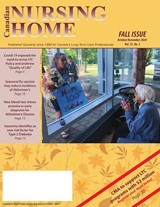 • November – “COVID-19 highlights the urgent need for review of long-term care…and QoL must be central!”, an article by policy context stream authors Mary Jean Hande, Janice Keefe, & Dee Taylor, published in Canadian Nursing Home, Vol 31, No. 3, October/November 2020.
• November – “COVID-19 highlights the urgent need for review of long-term care…and QoL must be central!”, an article by policy context stream authors Mary Jean Hande, Janice Keefe, & Dee Taylor, published in Canadian Nursing Home, Vol 31, No. 3, October/November 2020.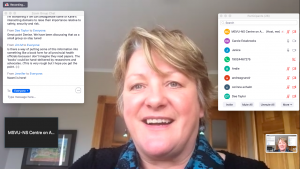 • May – Full Team videoconference to share stream level findings from Policy Context and Mapping Care Relationships researchers. Scientific Lead Janice Keefe hosted the virtual meeting of 26 SALTY team members including researchers, knowledge users and trainees.
• May – Full Team videoconference to share stream level findings from Policy Context and Mapping Care Relationships researchers. Scientific Lead Janice Keefe hosted the virtual meeting of 26 SALTY team members including researchers, knowledge users and trainees.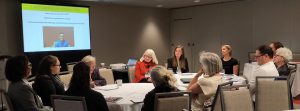 October – Dr. Dee Taylor, stream 4 Co-Lead Investigator and advisory group members Sandra Bauld, Faye Forbes and Corrine Schalm held a workshop at the Canadian Association on Gerontology (CAG) 2019 conference titled “The rewards and pitfalls of authentic inclusion of stakeholders in the analysis of nursing home policies”. SALTY Trainee, Emily Hubley, also presented a Stream 4 poster on the role of volunteers in enhancing resident quality of life in long term care.
October – Dr. Dee Taylor, stream 4 Co-Lead Investigator and advisory group members Sandra Bauld, Faye Forbes and Corrine Schalm held a workshop at the Canadian Association on Gerontology (CAG) 2019 conference titled “The rewards and pitfalls of authentic inclusion of stakeholders in the analysis of nursing home policies”. SALTY Trainee, Emily Hubley, also presented a Stream 4 poster on the role of volunteers in enhancing resident quality of life in long term care.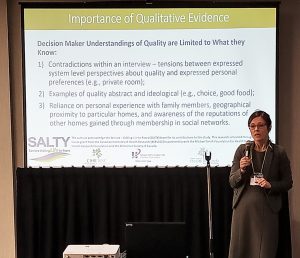 October – Dr. Katie Aubrecht, stream 2 Co-Lead Investigator presented “A room with a view: unpacking decision maker perceptions and assumptions about the meaning of quality long-term care” at the Canadian Association on Gerontology (CAG) 2019.
October – Dr. Katie Aubrecht, stream 2 Co-Lead Investigator presented “A room with a view: unpacking decision maker perceptions and assumptions about the meaning of quality long-term care” at the Canadian Association on Gerontology (CAG) 2019.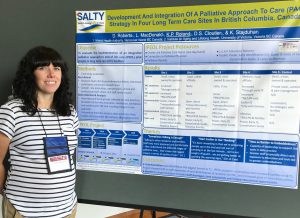 September – Oral presentation on integrating a palliative approach in long-term care homes and poster presentation on the development and integration of a palliative approach to care strategy by Kailyn Roland, stream 3 Research Associate, at the Canadian Hospice Palliative Care conference in Ottawa.
September – Oral presentation on integrating a palliative approach in long-term care homes and poster presentation on the development and integration of a palliative approach to care strategy by Kailyn Roland, stream 3 Research Associate, at the Canadian Hospice Palliative Care conference in Ottawa. Janice Keefe & Dr. Mathias Hoben on how SALTY research informs quality of life for older adults living in residential long-term care.
Janice Keefe & Dr. Mathias Hoben on how SALTY research informs quality of life for older adults living in residential long-term care.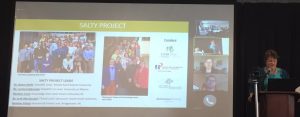 June –Featured panel presentation at the Northwood Research Symposium on the cross stream emerging evidence to support quality of life in long term care by Janice Keefe and Katie Aubrecht in-person, and Denise Cloutier and Matthias Hoben via video technology.
June –Featured panel presentation at the Northwood Research Symposium on the cross stream emerging evidence to support quality of life in long term care by Janice Keefe and Katie Aubrecht in-person, and Denise Cloutier and Matthias Hoben via video technology. May – Oral panel presentations on embodying qualities of everyday lives in long term care by Tamara Daly, Susan Braedley, Katie Aubrecht, Prince Owusu and Vasuki Shanmuganathan at the Trent Aging joint conference of North American and European Networks on Aging
May – Oral panel presentations on embodying qualities of everyday lives in long term care by Tamara Daly, Susan Braedley, Katie Aubrecht, Prince Owusu and Vasuki Shanmuganathan at the Trent Aging joint conference of North American and European Networks on Aging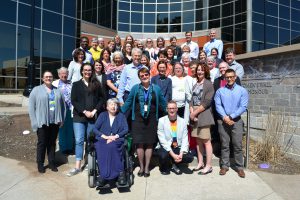 May – In-person team meeting – Halifax, NS May 27th – 28th.
May – In-person team meeting – Halifax, NS May 27th – 28th.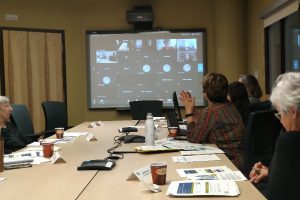 February – full team video conference meeting to share and discuss project stream finding
February – full team video conference meeting to share and discuss project stream finding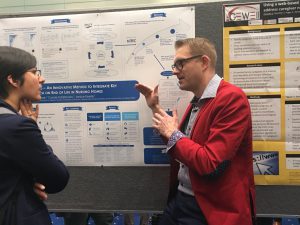
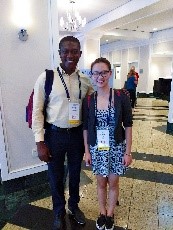 August – SALTY Trainees Prince Owusu and Lily Lu attended the Knowledge Mobilization Master Class at the International Federation on Aging (IFA) conference in Toronto on August 7th.
August – SALTY Trainees Prince Owusu and Lily Lu attended the Knowledge Mobilization Master Class at the International Federation on Aging (IFA) conference in Toronto on August 7th.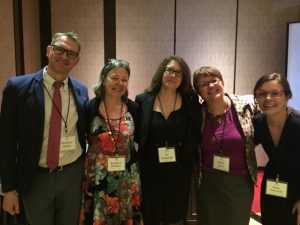 May – panel presentation by stream leads at Canadian Association of Health Services and Policy Research Conference, Montreal
May – panel presentation by stream leads at Canadian Association of Health Services and Policy Research Conference, Montreal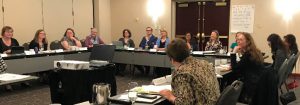 January – In-person meeting of stream 1 to discuss stream activities.
January – In-person meeting of stream 1 to discuss stream activities.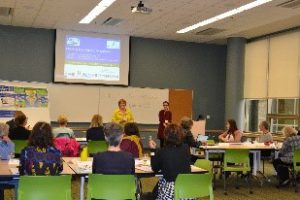 November – Dr. Janice Keefe, Dr. Katie Aubrecht, Dr. Matthias Hoben, Dr. Della Roberts and Dr. Dee Taylor hosted a NS provincial sector workshop at Mount Saint Vincent University for key decision makers and stakeholders from the Nova Scotia long term care sector.
November – Dr. Janice Keefe, Dr. Katie Aubrecht, Dr. Matthias Hoben, Dr. Della Roberts and Dr. Dee Taylor hosted a NS provincial sector workshop at Mount Saint Vincent University for key decision makers and stakeholders from the Nova Scotia long term care sector.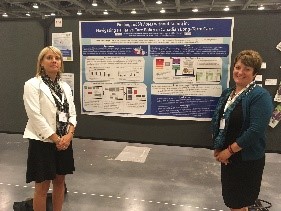 July – Dr. Dee Taylor presented “Finding rabbit holes without falling in: Navigating palliative care policy in Canadian Long-term Care” poster at the International Association of Gerontology and Geriatrics (IAGG) 2017 World Congress in San Francisco.June – “Seniors – Adding Life to Years: A Canadian Project Focusing on Late Life Long Term Care” poster displayed at Northwood Research Symposium. June – Stream 4 completed the policy document retrieval and coding. June – In person meeting of Stream 2 to discuss stream activities.
July – Dr. Dee Taylor presented “Finding rabbit holes without falling in: Navigating palliative care policy in Canadian Long-term Care” poster at the International Association of Gerontology and Geriatrics (IAGG) 2017 World Congress in San Francisco.June – “Seniors – Adding Life to Years: A Canadian Project Focusing on Late Life Long Term Care” poster displayed at Northwood Research Symposium. June – Stream 4 completed the policy document retrieval and coding. June – In person meeting of Stream 2 to discuss stream activities.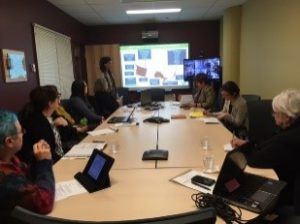 May – Full team meeting via video conference technology, May 9.
May – Full team meeting via video conference technology, May 9.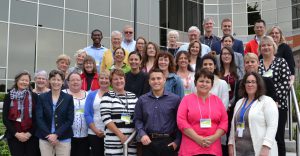 September – First in-person team meeting – Halifax, Nova Scotia, September 18th – 20th.
September – First in-person team meeting – Halifax, Nova Scotia, September 18th – 20th.